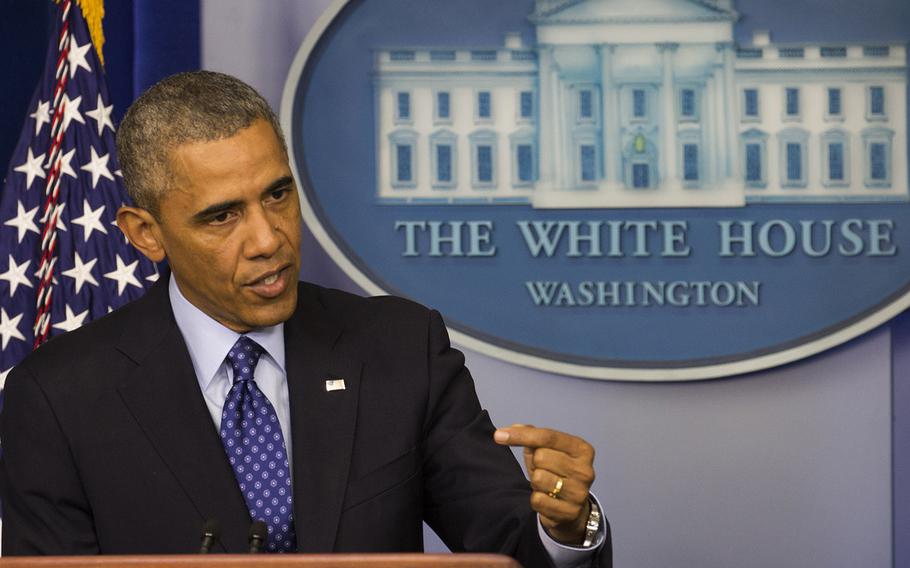
President Barack Obama talks about the situation in Iraq during a news conference Thursday, June 19, 2014, at the White House. (Joe Gromelski/Stars and Stripes)
WASHINGTON — The White House on Thursday sent Congress a trimmed-down, $65.8 billion overseas contingency budget that includes funding for the end of the Afghanistan war as well as arms and training for “appropriately vetted” Syrian rebels.
The plan cuts $19.5 billion from the DOD’s share of an earlier estimate of the 2015 U.S. war budget as the Obama administration plans to draw down forces in Afghanistan beginning at the end of the year.
The Overseas Contingency Operations budget includes, for the first time, money to arm and train moderate Syrian rebels that are not only fighting President Bashar Assad’s government but also a wing of the same al-Qaida-inspired group challenging the U.S.-backed leadership in Iraq.
Those funds are part of a new $5-billion pot of money called the counterterrorism partnerships fund, an initiative announced by President Barack Obama on May 28 during a West Point speech on the future of U.S. counterterrorism efforts.
The proposal finally puts a figure on overseas war and counterterrorism spending after Capitol Hill lawmakers have for months used a $79 billion placeholder as they plan for the coming fiscal year. It also provides a U.S. plan of action as the continuing civil war in Syria has spilled over into Iraq and destabilized that country after an eight-year U.S. occupation.
The House and Senate will now craft their versions of OCO spending bills as the overall 2015 defense budget begins to take shape on Capitol Hill. Lawmakers are likely to wrangle over Obama’s foreign policy and counterterrorism vision and make various changes.
National Security Council Spokeswoman Caitlin Hayden said the budget focuses specifically on counterterrorism partnerships across the Middle East and North Africa — an argument aimed at critics opposed to deeper involvement in the Syrian war.
“In particular, we are seeking $500 million for a proposed authority to train and equip appropriately vetted elements of the moderate Syrian armed opposition,” Hayden said in a statement. “These funds would help defend the Syrian people, stabilize areas under opposition control, facilitate the provision of essential services, counter-terrorist threats, and promote conditions for a negotiated settlement.”
She said the money will be aimed at empowering moderate opposition to the Assad regime, which has been waging a brutal war since 2011 to beat back a diverse uprising and retain control of the fractured country.
As the war grinds on, Syria has become an incubator for radical Islamist groups that now pose a grave threat to stability in the region. The Islamic State of Iraq and the Levant, or ISIL, is an al-Qaida splinter group that has flourished in the Syrian mayhem and now seized large swaths of Iraq. The U.S. sent in Special Forces advisers this week to assist the government in Baghdad and weighed the use of air strikes.
Critics, however, fear weapons sent to moderates may end up in the hands of the very forces that the administration wants to defeat in Iraq.
“While we continue to believe that there is no military solution to this crisis and that the United States should not put American troops into combat in Syria, this request marks another step toward helping the Syrian people defend themselves against regime attacks, push back against the growing number of extremists like ISIL who find safe-haven in the chaos, and take their future into their own hands by enhancing security and stability at local levels,” Hayden said.
The budget anticipates the winding down of combat operations in Afghanistan, now the longest war in American history.
Obama announced in May that the military will draw down to about 10,000 troops and transition to an advisory mission by the end of December 2014. However, the administration said Thursday that costs will not decline quickly despite the official end of the war.
“For example, DOD will still incur significant costs to transport personnel, supplies, and equipment back to their home stations,” the White House wrote in a statement.
The Afghan national army will also require continued funding to handle security, the administration said. Taliban forces have already staged offensives in areas where U.S. forces have left after gaining hard-fought progress over years of combat.
tritten.travis@stripes.com Twitter: @Travis_Tritten